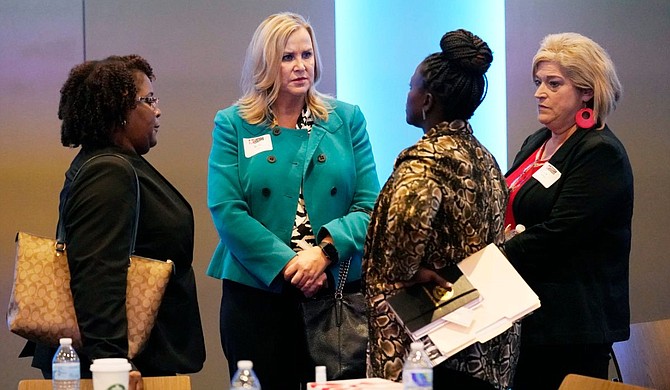Business leaders, law enforcement officers, policy groups and government officials met at the Two Mississippi Museums to discuss ways to reduce recidivism and barriers to formerly incarcerated people having healthy, stable lives after prison. Photo by Rogelio V. Solis via AP
JACKSON, Miss. (AP) — Mary Johnson felt her self-confidence take a hit when she was imprisoned in Mississippi in 2012.
Johnson had gone to school for accounting and worried that the stigma of serving prison time would prevent her from working again or having a normal life.
That changed when she got a job during her incarceration as an assistant to the director of administration at Mississippi Prison Industries Corporation, a nonprofit company that offers workforce training to incarcerated people. When she was released after 2 and 1/2 years, the company offered her a permanent job: She's now the director of administration herself.
“People make mistakes, but that mistake should not follow you around for the rest of your life — that should not be your title, that should not be your name,” she said Thursday at “Dollars & Sense of Second Chance Hiring,” a forum hosted by Right on Crime, a conservative group that seeks changes in the U.S. justice system.
Business leaders, law enforcement officers, policy groups and government officials met at the Two Mississippi Museums to discuss ways to reduce recidivism and barriers to formerly incarcerated people having healthy, stable lives after prison.
A top Mississippi corrections official said he no longer wants prisons to be seen as punitive institutions, but as “training centers” where people build skills that can help them find employment and maintain stable relationships once they are released.
“The punishment is deprivation of liberty — let's not add to it in other ways. We want to help them get better," said Pedro Morena, deputy commissioner for division programs, education, re-entry and vocational rehabilitation at the Mississippi Department of Corrections.
He said he meets a lot of people, like Johnson, who lack confidence while in prison. They see themselves as only inmates, instead of people with more complex, multifaceted identities.
“It’s the worst, most destructive thing we can have," Morena said, of “negative self-talk.” “If we can change our mind and see ourselves as aspiring for something else — as an employee — then our behavior changes."
The Central Mississippi Correctional Facility now offers workforce training programs covering topics such as business technology — which helps inmates develop computer skills — cosmetology and upholstering. People can also take classes to earn high school diplomas or college credits.
Morena said the department is looking to expand those programs. Recently, there's been interest in welding at CMCF, so staff is setting up a trailer with eight welding simulators for people to learn and train on.
Mississippi Prison Industries has programs inside prisons where incarcerated people can work in garment, metal and wood shops.
Morena said it will take more than instituting new programs to change the culture in the prison system — it also will require a change in institutional mindsets.
“The correctional officers, all the way to the wardens and superintendents, need to understand that these are places for rehabilitation, for correction, for change for the better," Morena said.
“We’re working with correctional officers for them to understand they are correctional officers, there’s no more ‘prison guards,'" he said. "Anybody can be a prison guard. We want the correctional officers to help people get corrected."
To help make that change, the Department of Corrections and the state community college board are designing a program for correctional officers to take criminal justice classes and possibly earn degrees. Correctional officers will have the opportunity for incentives such as pay raises if they complete the programs.
“We know that the entire culture of the prisons need to change and we need to lift everyone up to a new level," said Audra Dean Love, Mississippi Community College Board assistant executive director for academic and student affairs.
Johnson said she thinks those programs will help incarcerated people.
“I think that would play a big role in the attitudes of people coming out, if they had someone working with the inside that is working with them to help support them and treating them better," she said.
More like this story
- City Calls on Companies to Offer ‘Fresh Start'
- Watchdog Group: Mississippi Prison Industries Not Effective
- Ex-Prisoners Get a Boost Amid MDOC Turmoil
- MDOC Re-Entry Symposium Addresses Hurdles, Solutions for Returning Citizens
- State Corrections Agency Replacing Military Strategy to Stop Repeat Offenders



Comments
Use the comment form below to begin a discussion about this content.
comments powered by Disqus